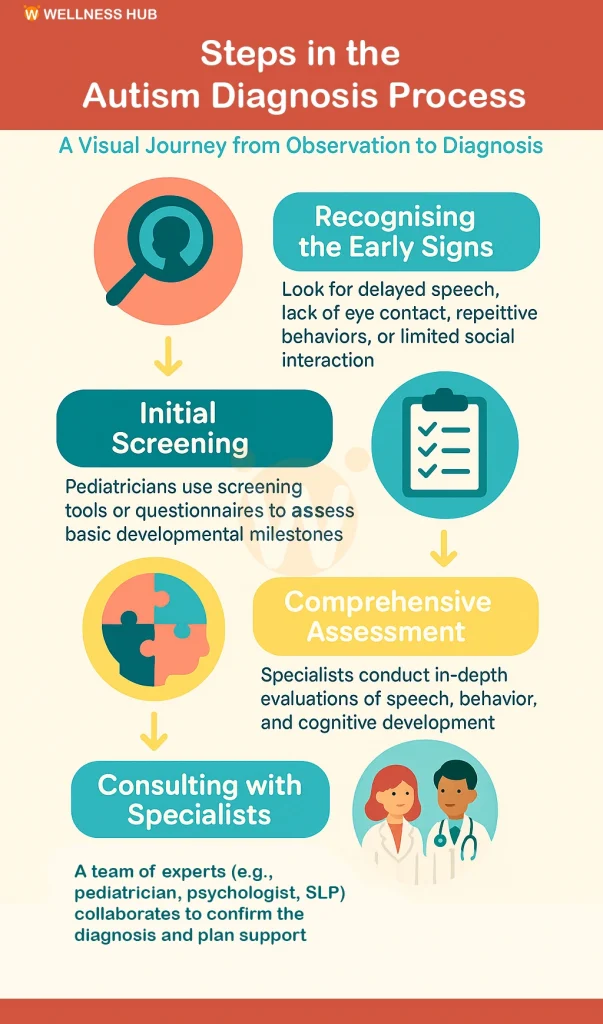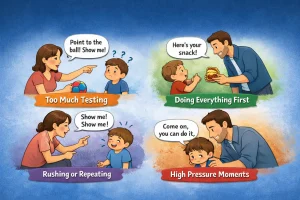How is Autism Diagnosed? Steps, Tools, and Who to Consult
By Rajini D
Last Updated: June 5, 2025
Autism diagnosis is crucial for setting the stage for tailored interventions and supports. Autism diagnosis is crucial for setting the stage for tailored support. It involves a detailed evaluation by specialists who assess behavior and developmental history. The goal is to determine whether an individual has autism spectrum disorder. This process helps parents, caregivers, and professionals make informed decisions. Early diagnosis is especially important. It allows timely intervention, which can boost communication, social skills, and overall quality of life.
Take our free, expert-designed autism screening to spot early signs and guide your next steps. Check Now
Steps in the Autism Diagnosis Process
Navigating the path to an autism diagnosis can be daunting, but understanding each step can empower you as you advocate for your child or loved one. Here’s a straightforward look at the process, designed to guide you through from the first concerns to a formal diagnosis.
Step 1: Recognizing the Early Signs of Autism
The journey often begins with the observation of early signs in toddlers and children. Common indicators include lack of eye contact, delayed speech development, limited interest in social interactions, repetitive behaviors, and an unusual focus on specific objects. Early recognition is crucial, as it prompts the initial steps towards getting the help and support needed. Understanding these signs can be your first clue that it’s time to seek further evaluation from professionals.
Step 2: Initial Autism Screening
Screening plays a pivotal role in identifying potential developmental issues that might warrant a closer look. This step doesn’t provide a diagnosis but highlights whether there’s a significant risk of autism. Screenings are usually quick and conducted through questionnaires or simple interactions with the child. If the screening suggests a higher likelihood of autism, it’s recommended to proceed to a more detailed assessment.
Step 3: Comprehensive Autism Assessment
After screening, the next step is a thorough autism assessment conducted by specialists. This in-depth process includes a variety of diagnostic tools and evaluations, such as cognitive and language assessments, behavioral evaluation, and sometimes, genetic testing. The goal is to understand the child’s unique profile, strengths, and challenges. This comprehensive evaluation is crucial for formulating an effective intervention plan.
Step 4: Professional Consultation for Autism Diagnosis
The final step involves a detailed consultation with medical professionals who specialize in developmental disorders. Pediatric neurologists, developmental pediatricians, or child psychologists might be involved, depending on the case’s complexity. These professionals use the data gathered during the assessment to confirm a diagnosis of autism. They also guide families on the next steps, including therapies and educational programs tailored to the child’s needs.

Autism Diagnostic Tools: How Are They Used?
Understanding the tools used in the autism diagnosis process can demystify what to expect and help you prepare for consultations and assessments. These tools are designed to provide a thorough understanding of an individual’s developmental level, social behavior, communication abilities, and more.
Tools for Screening and Evaluation
The journey to a formal autism diagnosis often begins with basic screening tools, which are simple, quick assessments used to determine if a child is at risk of autism. These tools include:
- Questionnaires: Often filled out by parents, these can detail a child’s developmental milestones and current behavioral patterns.
- Observation: Specialists observe the child in a structured setting to note any behaviors that are indicative of autism.
- Behavioral Assessments: More detailed than observational methods, these assessments look into specific areas such as the ability to follow directions, respond to their name, or interact with others.
The Role of Specialists in Autism Diagnosis
A range of healthcare professionals may be involved in the diagnostic process, each bringing a unique expertise:
- Pediatricians: Often the first point of contact, pediatricians can provide initial screenings and referrals to specialists.
- Psychologists: Clinical or developmental psychologists perform detailed assessments and are qualified to diagnose autism based on psychological testing.
- Speech-Language Pathologists: These specialists assess and treat children with communication disorders, which are often part of autism.
- Neurologists: In some cases, especially where neurological symptoms are evident, a neurologist might be consulted.
- Occupational Therapists: They evaluate sensory and motor skills and can provide insight into the daily living challenges a child with autism might face.
Who to Consult for an Autism Diagnosis
Seeking a diagnosis for autism can be overwhelming, but knowing who to consult can streamline the process and ensure you’re getting comprehensive care. Here’s a guide on who to approach and what each professional’s role entails in the diagnosis of autism.
Consulting a Pediatrician for Autism Diagnosis
The journey typically begins with your pediatrician, often the first healthcare provider to assess developmental concerns. Pediatricians are trained to recognize the early signs of autism during routine developmental screenings. If they observe signs that may suggest autism, they can provide an initial evaluation and refer you to specialized professionals for further assessment.
What to expect: During the visit, the pediatricians will review your child’s health records, ask about developmental milestones, and observe your child’s behavior. If developmental concerns arise, the pediatrician may recommend taking an autism screening test to identify potential signs. These screenings typically involve parent-reported questionnaires that assess communication, behavior, and social interaction patterns. If the screening suggests possible developmental delays or risks associated with autism, the pediatrician will refer you to a specialist for a more comprehensive evaluation.
Role of Speech-Language Pathologists in Autism Diagnosis
Speech-language pathologists (SLPs) play a critical role, especially since communication challenges are a core aspect of autism. SLPs assess speech, language, pragmatic language (social use of language), and non-verbal communication skills. Their evaluations are crucial in determining the presence of communication delays or disorders associated with autism.
How they contribute: SLPs use a variety of tests to measure language understanding, ability to form sounds, and practical use of language in social situations. Their findings help build a profile of a child’s strengths and areas needing intervention and contribute to the overall assessment used to diagnose autism.
When to Seek a Specialist for Autism Diagnosis
While pediatricians and SLPs provide essential early assessments, diagnosing autism often requires consultation with specialized professionals who have specific expertise in developmental disorders.
Specialists to consider:
- Developmental Pediatricians: These are pediatricians with special training in child development and behavior. They are equipped to perform comprehensive evaluations that include medical, behavioral, and psychological aspects.
- Clinical Psychologists: They specialize in understanding behavioral and mental processes and are qualified to conduct in-depth psychological assessments and cognitive testing to diagnose autism.
- Neuropsychologists: These professionals specialize in understanding brain-behavior relationships and can assess how a child’s brain function affects their behavior and learning.
The Importance of Early Autism Diagnosis
Understanding the significance of an early autism diagnosis is paramount for any parent or caregiver observing developmental delays in a child. Early detection can set the stage for effective interventions that significantly enhance the child’s quality of life and overall development.
Why Early Diagnosis is Crucial for Children
An early diagnosis of autism can transform the developmental trajectory of children. It opens the door to targeted early intervention services that are crucial during the critical development window in a child’s early years. Early interventions tap into the plasticity of the young brain and help improve communication, social skills, and behavioral adaptations.
Benefits of early diagnosis include:
- Enhanced Development: Early interventions can improve key areas of development such as language, cognitive abilities, and social skills.
- Reduced Family Stress: When parents understand their child’s needs early, they are better equipped to support their development and manage behaviors effectively.
- Better Long-term Prognosis: Children who receive early intervention often have better outcomes in school and social environments as they grow older.
How an Early Autism Diagnosis Can Help Your Child Thrive
Identifying autism early isn’t just about labeling; it’s about providing a roadmap for effective support and therapies that cater to a child’s specific needs. Early identification leads directly to tailored intervention strategies that help in nurturing the child’s potential.
Key impacts of early diagnosis and intervention:
- Personalized Support Plans: With an early diagnosis, therapists can develop intervention plans that align with the child’s specific developmental needs and strengths.
- Skill Development: Early intervention programs often include therapies that improve language, motor, and social skills through structured and play-based learning.
- Family Empowerment: Early diagnosis educates families about autism, enabling them to make informed decisions about therapies, schooling, and daily activities.
Common Misconceptions About Autism Diagnosis
Many myths surround autism diagnosis, often creating confusion and delaying timely, effective understanding and support for individuals with autism. By debunking these myths, we can foster a more informed and supportive environment.
Debunking Myths Surrounding Autism Diagnosis
1. Autism is always diagnosed in childhood.
- Reality: While many cases of autism are identified in early childhood, it’s not uncommon for a person to reach adulthood without a diagnosis. Adults who have lived without a diagnosis may seek one after learning about autism and recognizing their own experiences in the symptoms described.
2. Autism can be cured.
- Reality: Autism is a lifelong developmental condition. There are no cures, but targeted interventions can help manage symptoms and improve quality of life. The goal of diagnosis and subsequent therapy is not to cure but to support and enhance abilities and integration into society.
3. Autism diagnosis is just about medical tests.
- Reality: Diagnosing autism involves a comprehensive assessment that includes behavioral evaluations and developmental history rather than medical tests like blood tests or MRIs. It’s about understanding an individual’s unique challenges and strengths.
4. A diagnosis of autism is a label that will limit my child’s future.
- Reality: A diagnosis is actually a tool that can open doors to resources, support, and interventions. It helps tailor educational and developmental strategies to the individual’s needs, aiming to maximize their potential.
5. If you have autism, you’re just like everyone else with autism.
- Reality: Autism is a spectrum disorder, meaning it manifests differently in each person. Two individuals with the same diagnosis can have very different abilities, challenges, and needs.
Know more: Busting Common Myths About Autism: What You Need to Know
Conclusion
Understanding the steps to diagnose autism is crucial. Start by recognizing early signs, like social challenges or repetitive behaviors. Consult with your child’s doctor for an initial screening and, if needed, follow up with detailed assessments from specialists. Acting early is key—early intervention can significantly improve your child’s development and daily life. Don’t hesitate; if you see signs, speak to a professional. At Wellness Hub, we are here to support you at every step of this journey. We create resources and tools that help families navigate the diagnosis process and move forward with effective therapies, educational strategies, and community support.
Frequently Asked Questions:
1. What are the first signs of autism in children?
The initial signs of autism can vary but often include avoiding eye contact, having delayed speech or not speaking at all, showing little interest in playing with other children, engaging in repetitive movements like rocking or flapping, and insisting on strict adherence to routines. If you notice these behaviors consistently, it may be time to consult a healthcare professional.
2. When should I get my child screened for autism?
Start screening your child as soon as you notice developmental delays or unusual behaviors, especially in social interaction, communication, or flexibility in behavior. The American Academy of Pediatrics advises parents to screen all children for developmental disorders during their 18- and 24-month well-child visits. However, if you have concerns earlier, take action right away—don’t wait.
3. What does an autism screening involve?
Autism screening typically involves filling out a questionnaire about your child’s behaviors and developmental milestones. This can be done by a pediatrician or a specialist. The questionnaire may cover your child’s ability to make eye contact, respond to their name, use gestures, play with others, and adapt to changes in routine.
4. Who can diagnose autism?
Diagnosing autism typically requires a team of specialists, which may include developmental pediatricians, child neurologists, child psychologists, or psychiatrists. These professionals have specialized training to evaluate and diagnose autism using various tools and observations.
5. What happens during an autism assessment?
An autism assessment is a thorough review where a specialist observes the child’s behavior, conducts tests, and gathers information from parents about the child’s development. This may include direct interaction with the child, structured play sessions, and interviews with caregivers to gather a full picture of the child’s abilities and challenges.
6. Can autism be diagnosed in just one appointment?
Typically, diagnosing autism cannot be completed in a single appointment. It requires a series of evaluations to accurately understand the child’s behavioral and developmental nuances. Follow-up appointments are often necessary to gather sufficient information for a diagnosis.
7. What are the benefits of an early autism diagnosis?
An early autism diagnosis can be crucial in accessing early intervention services that significantly improve outcomes. These services can help develop key skills, including communication, social skills, and adaptability. Early diagnosis also helps families and educators plan better for the child’s educational and social needs.
8. How can I prepare for my child’s autism assessment?
To prepare, collect any relevant medical records and notes on your child’s developmental milestones and behaviors. Note any specific behaviors that concern you or are unusual. Bring videos or a diary of these behaviors to show concrete examples during the assessment.
9. Where can I find support after an autism diagnosis?
After a diagnosis, you can find support through local and online autism communities, support groups, and through resources provided by organizations like Autism Speaks or the Autism Society. Wellness Hub’s Autism Support offers a range of resources including therapy options, educational materials, and community forums to connect with other families.
10. Is there financial aid available for autism therapies?
Financial aid for autism therapies may be available through various sources such as government programs, private insurance, and grants from non-profit organizations. It’s important to talk to your healthcare provider about what programs are available in your state or region and how to apply for assistance.
About the Author:
Rajini Darugupally
M.Sc., Speech-Language Pathologist (9+ years of experience)
Rajini is a passionate and dedicated Speech-Language Pathologist with over 9+ years of experience, specializing in both developmental speech and language disorders in children and rehabilitation in adults. Driven by a desire to empower each individual to find their voice, Rajini brings a wealth of experience and a warm, genuine approach to therapy. Currently, at Wellness Hub, she thrives in a team environment that values innovation, compassion, and achieving results for their clients.
Book your Free Consultation Today
Parent/Caregiver Info:
Client’s Details:
* Error Message









